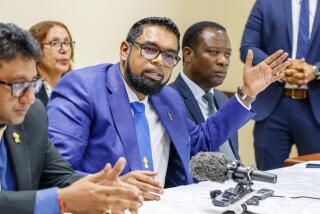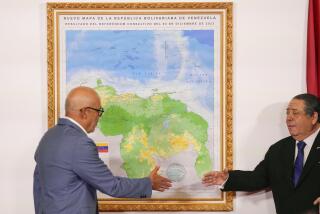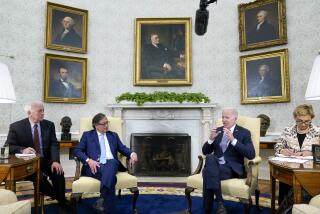Chavez seeks to free hostages
- Share via
BOGOTA, COLOMBIA — Venezuelan President Hugo Chavez said Friday that he expected to meet soon in Caracas with a leader of Colombia’s largest rebel group in an effort to help secure the release of dozens of hostages the leftists are holding.
The announcement came at the end of Chavez’s meeting with Colombian President Alvaro Uribe at Uribe’s presidential retreat outside Bogota, the capital, capping a two-week period in which Chavez’s possible role as a mediator with the Revolutionary Armed Forces of Colombia, or FARC, raised hope among family members of the hostages for a breakthrough.
His previous offers to get involved in talks with the rebels had been rebuffed, Chavez said. He is known to be held in high regard among the rebel groups for his socialist policies.
But now, he has been given the “green light” by Uribe, Chavez said at a news conference after the leaders met.
“The task is not easy, but I’ll be taking it on, looking for some kind of formula” for the rebels and Uribe’s government to strike an agreement to secure the release of 45 high-profile hostages held by the rebels. They include three U.S. employees of defense contractor Northrop Grumman Corp., who have been held captive since 2003, and onetime Colombian presidential candidate Ingrid Betancourt, who was seized in 2002.
Uribe, elected last year to a second four-year term, is immensely popular at home. But he is under fire from some domestic and international critics for not doing more to secure the release of the high-profile political captives and about 3,000 other hostages held by the FARC and other rebel and criminal groups.
Uribe said Friday that he was trying. Over the summer, he unilaterally released 157 suspected FARC militants from Colombian jails in hope that the rebels would reciprocate. He also complied with a request from French President Nicolas Sarkozy in June that he release jailed FARC leader Rodrigo Granda.
Despite hope that Sarkozy had secured assurances from the rebels that Granda’s release would spring the hostages, the FARC has not let any go.
The biggest stumbling block is the FARC’s demand that Uribe grant it a zone in western Colombia, where, the rebels say, the group would release prisoners free of military harassment.
Uribe refuses to budge on his long-held opposition to establishing such a zone, saying that a similar concession by former President Andres Pastrana merely gave the rebels a free hand to organize drug trafficking and kidnappings.
The climate worsened June 18 when the FARC announced that 11 of the 12 members of the Valle del Cauca state assembly it had kidnapped in Cali in 2002 had been killed in an unspecified “military operation.”
Uribe said that the deputies were executed. The bodies have not been recovered.
Chavez said Friday before leaving for Bogota that he had received an answer directly from the FARC to his offer to facilitate talks on releasing the hostages. He declined to reveal details of the response or who sent the message, only that he expected to meet with a member of the FARC “secretariat.”
Chavez’s possible involvement follows a visit to Caracas, the Venezuelan capital, two weeks ago by Colombian Sen. Piedad Cordoba, who went with Uribe’s blessing. Days later, Chavez met with a group of the hostages’ family members, including Betancourt’s mother. He promised her that he would do what he could to help strike a deal.
Uribe and Chavez reportedly wrangled over Chavez’s agenda during his visit, with Uribe reportedly quashing Chavez’s request to visit with the families.
Although they are political opposites, with Chavez a strong opponent of the U.S. and Uribe a strong ally, the two seem to have a friendly relationship.
Chavez thanked Uribe for supporting his government during a strike by national oil company managers that began in late 2002 and nearly paralyzed Venezuela. The Colombian leader thanked Chavez for interceding in peace talks with another leftist rebel group, the National Liberation Army.
More to Read
Sign up for Essential California
The most important California stories and recommendations in your inbox every morning.
You may occasionally receive promotional content from the Los Angeles Times.










